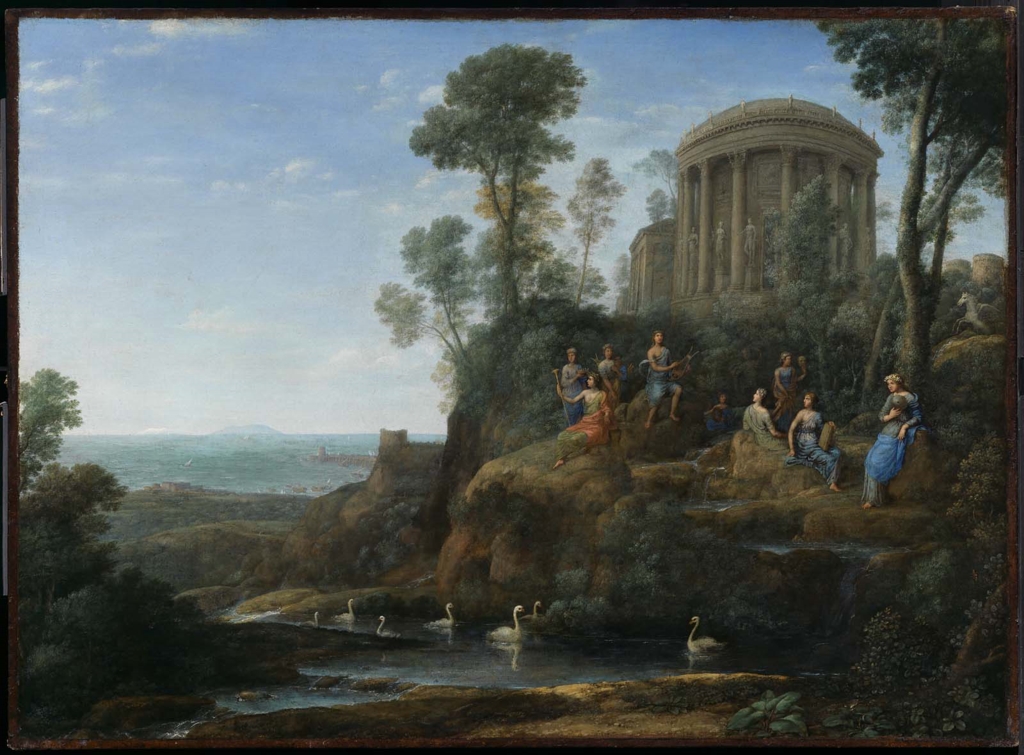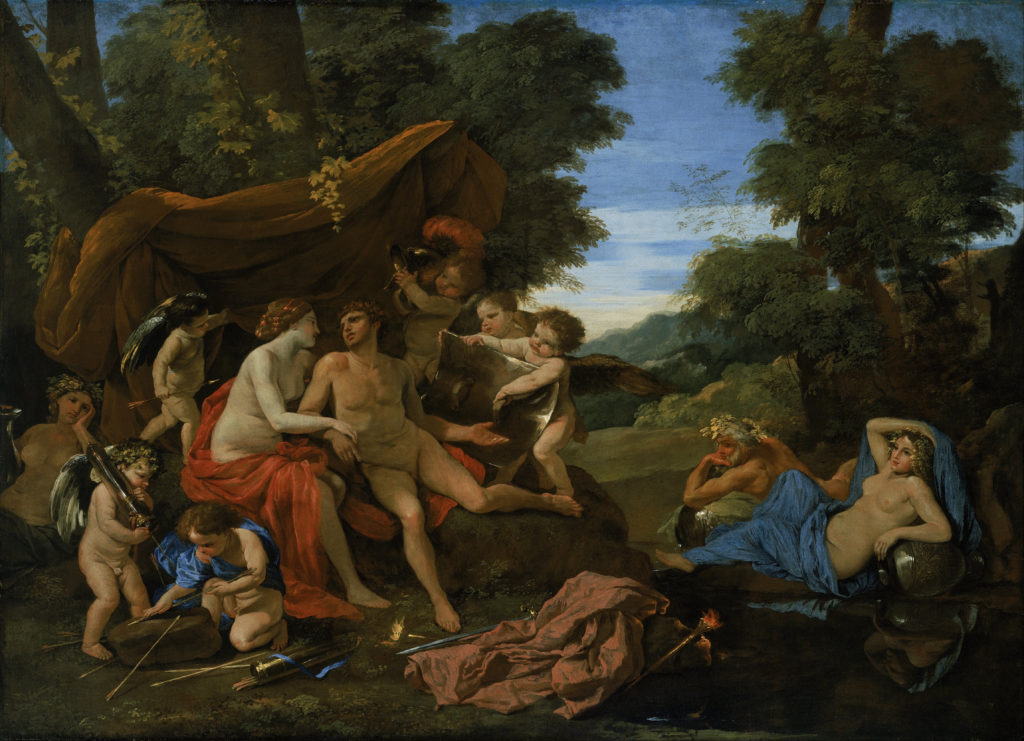
Claude Lorrain, Apollo Muses
What the Ancients did for Us
Michael McManus, on our pagan heritage
The pre-Socratic pagan philosopher Anaxagoras took two pots of paint, one black and one white. He took a drop of white and added it to the black, then a drop of black and added it to the white. There, said he, mixing them. We know that both pots have changed colour – that is a fact – but we cannot tell the difference with our senses. If our senses are unreliable on such a basic detail in front of our eyes, then how can we be forever certain of anything else – especially how states should be organised or people ruled?
If by ‘us’ is meant conservatives, then pre-Socratic philosophers did a lot for us. Many of them favoured the conservative, pragmatic, cautious, live-and-let-live approaches to knowledge and policy that eschew the arrogance and certainty of dogma and ideology. ‘In human affairs,’ wrote Xenophanes, ‘there is no certain truth, and all our knowledge is but a woven web of guesses.’ Empedocles cautioned against our tendency to assume that we know more than we do: ‘Having seen only our own part of life, swift to die, we fly away like smoke, certain only of what we have met ourselves.’ Heraclitus pondered on the link between time and change and famously concluded that not only can we never step into the same river twice but that we ourselves are not the same person that we were on the first occasion. Ideologues imagine that they can implement a fixed system of state rule that applies once and for all: one man, one vote, one time, as a satirist put it. Lacking such arrogance, born of a cramped knowledge of the world, conservatives remain humble in the face of changing events. Beware the person of one book, cautioned Aquinas. He might have had twentieth century communists and theocrats in mind.
Edmund Burke, in a flight of fancy, spoke of trusteeship, the responsibility that falls upon us as a consequence of constant change. We the living have inherited much from those who have died, and we cannot avoid reflecting on what future we are bequeathing to generations yet to come. Our lives are inextricably tied up with those who have been, those who are, and those who are to come. There is a sense of timelessness, perhaps immortality, which is fundamental to human consciousness: even the most diehard atheist cannot avoid wondering how the small human head can contain universes, and be conscious of its own consciousness.
The Greeks thought about that too. Pythagoras, remembered now only for his hypotenuse, reasoned that if the soul is immortal, it must travel from one living thing to another when bodies die. One corollary of this was his assertion that the soul enters the foetus at conception, and in this he was centuries ahead of the Catholic Church. He and his followers abstained from meat lest the soul of a friend might repose in a slaughtered animal. It is easy to make fun of this belief as Shakespeare did in Twelfth Night. Malvolio’s madness is confirmed when he refuses to accept Pythagoras’ opinion of wildfowl, therefore accused of endangering the soul of his grandmother by eating a woodcock. Aristotle dismissed transmigration of souls out of hand, but such a belief does lead to the sense of continuity that Burke wrote of, and a sense of responsibility for past, present and future. There is an ethical dimension to Pythagoreanism, the fellowship with others, and with the fauna and flora of the earth that Burke meant by trusteeship.
It is difficult to say precisely what conservatism encompasses for in favouring maximum liberty and opportunity and being open to fresh ideas and evidence, it is not possible to be as specific and programmatic as a socialist or fascist or absolute ruler, monarchical or religious. Aristotle – the pagan philosopher – wrote that democracy was ‘the least bad perversion’ of perfect rule (that is by wise, virtuous, rich, high-born, leisured people like himself) compared to oligarchy and tyranny. Republican Abe Lincoln once quoted Aristotle’s ‘least bad’ comment. Aristotle’s Politics drew on evidence from some of the thousand Greek city states; it is surprisingly accessible and still relevant to our modern world. He might be puzzled that fascists, socialists and theocrats regard each other as opposites and do not recognise their common feature, which is tyranny. There is no doubt that the checks and balances of the American constitution, safe from tyranny, whatever liberal critics of President Trump say, were devised with Aristotle’s work in mind. He argued that a good state constitution depended on the goodness of people and families from which it was composed. Burke proposed the same idea when he spoke of families as little platoons from which grew a nation of free people with a sense of duty and responsibility
For conservatives, liberty and individual responsibility go together: the duty to generously cooperate with fellow citizens is a key virtue. Wise governments do what they can to make sure that the underprivileged are enabled to make the most of the opportunities available: one cannot have equality of opportunity if some runners are hampered at the starting gate. But life is not wholly determined nor are individuals entirely helpless. At the start of The Odyssey, Zeus addresses the gods, thus: ‘It is deplorable that men blame us and say we are the cause of their troubles when their problems are all their own fault.’ He used the murder of Agamemnon by Clytemnestra and Aegisthus as an example: ‘Hermes warned then it would lead to disaster, and so it has because they didn’t listen. It was not their destiny but their choice.’ Shakespeare, who mocks Aristotle and Pythagoras in his plays, certainly agreed with this sentiment. In Julius Caesar he has Cassius say ‘Our faults, dear Brutus, lie not in our stars but in ourselves’.
Scientific and medical progress are amongst the triumphs of free-market capitalism that no totalitarian state can match. The free-thinking Greeks, in keeping with their imaginative scepticism, also made advances in scientific, technical and medical knowledge. One could argue that the search for the fundamental, irreducible elements of Mendeleev’s Periodic Table began with the Greeks. It was obvious that water must be fundamental because it could not be reduced to anything else: steam or ice always reverted to water. Without water nothing grew, indeed it seemed to some that water turned into vegetation when it fell into the earth. Hippo, deservedly a little-known philosopher, went so far as to say that moisture was essential to perception: the dry soles of feet were therefore less sensitive than fingers. Old men, he said, lacked the perception of youth because they were dried up. It is consoling for oldies to know that he was mocked in his own time.
The same irreducible, elemental character applied to fire and air. Air was sometimes equated with wind but Empedocles neatly demonstrated that air was present even when it could not be felt: he dipped a straw into a cup of water, put his finger over the end, lifted it out and released the captive water by lifting his finger. Earth was the fourth basic element, and it is less easy to understand pagan thinking here, as a handful of earth is plainly composed of different particles. The Greeks struggled to understand how the earth came to be and its cosmic situation. Anaximander suggested an evolutionary theory in which the sun warming the sea caused first fish, then animals, and finally humans to evolve. Democritus and others proposed that all matter was composed of minute particles that could not be divided further (a-tom means not cuttable). Both theories re-emerged with footnotes millennia later.
Doctors in many countries still take a version of Hippocratic oath to do one’s best for ‘man and woman, bond and free’. We still have Asclepius’ snake and rod medical symbol. Hippocrates discovered the properties of aspirin: chewed or infused in water it helped with fevers and the pain of childbirth. He and Pythagoras were the first to suggest that illnesses were caused by bodily imbalances rather than mean-spirited gods. Even epilepsy, baffling in its symptoms, was a disease according to Hippocrates not the work of a malicious immortal. He stressed that doctors should not make diagnoses only according to theories about moisture and heat in the body but should examine the actual patient. The Greeks were as alert to the values of different foods as we are, though some of their findings were off target. Hippocrates disapproved of cheese and Pythagoras of beans.
Concerning the pagan gods, it is debateable how seriously such stories were taken by the Greeks. Sacrifices were common and oracles were consulted but did the smarter Greeks really believe that the universe was in the capricious hands of immortals led by Zeus, a prolific rapist prone to tantrums who was married to his sister? Xenophanes thought that the crimes we attribute to the gods are projections of our own weaknesses. He mocked the notion of gods in the image of man: if horses and cows had gods, he said, they would look like horses and cows. Nor could there be more than one god, for only one could be all-powerful. Thinking along similar lines, Anaxagoras concluded that a divine mind must be the reason for order in nature, just as the human mind gave structure to our thoughts. Empedocles proposed that creation was infinite in extent and time, since nothing could come from nothing so everything must always have been.
Whatever they really thought of their theology, pagans tried hard to explain creation, the world around them, and the health of human bodies in reasoned, scientific terms. Their belief in divine intervention was perhaps no more serious than the clerical assertion some years ago that the flooding of Carlisle was God’s vengeance for homosexual marriage.
Aristotle’s work on ethics heavily influenced Christian theology, Aquinas in particular. Pagan thought should not be underestimated. Here are two final insights from Democritus which are still relevant. He proved that relativism in knowledge was self-refuting: ‘If all observations and opinions are equally true, then the observation that some observations are false must also be true. So, every observation or opinion cannot be true.’ He also anticipated Adam Smith’s rule that we should always behave as if an impartial observer was viewing our actions. ‘Even when alone,’ he said, ‘do nothing bad. Learn to feel shame before yourself as you would before others.’ There is still time for that ethic to sweep the world.

Nicholas Poussin, Mars and Venus
Michael McManus lives in Leeds, whose city emblem, like that of ancient Athens, is the owl (Minerva), a symbol of wisdom











Dear Mr McManus, thank you very much for this enlightening article and particularly on your notions on how the ancients perceived their Gods. There is so much misunderstanding among modern people on this issue that many call them idolaters etc. Perhaps in another article you would like to enlighten us about their humor and their free spirit regarding social institutions. Thank you very much for this article!